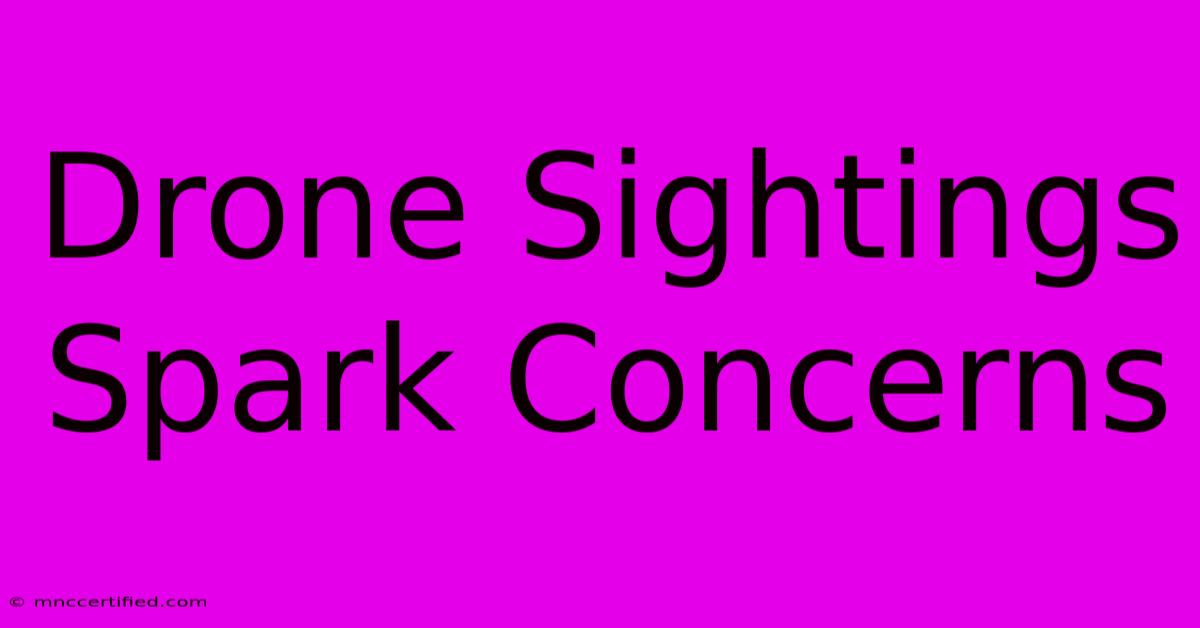Drone Sightings Spark Concerns

Table of Contents
Drone Sightings Spark Concerns: Safety, Privacy, and the Future of Unmanned Aircraft
Drone technology is rapidly advancing, making these unmanned aerial vehicles (UAVs) increasingly accessible and affordable. This proliferation, however, has sparked growing concerns regarding safety, privacy, and the potential for misuse. Increased drone sightings across various locations are fueling public anxieties and prompting crucial discussions about regulation and responsible drone operation.
The Rise of Drone Sightings and Associated Risks
The sheer number of drone sightings reported globally is on the rise. This isn't solely due to an increase in drone ownership; advancements in drone technology, including enhanced flight capabilities and longer battery life, contribute significantly. These sightings, often near airports, sensitive infrastructure, or populated areas, raise several significant concerns:
Safety Hazards:
- Air Traffic Interference: Drones pose a considerable risk to manned aircraft. Collisions, even with smaller drones, can have catastrophic consequences. Many incidents involve drones operating near airports, disrupting air traffic and potentially causing flight delays or cancellations. Airport safety is a paramount concern.
- Property Damage: Falling drones, or those operated recklessly, can cause significant damage to property. Imagine a drone crashing into a window or striking a pedestrian. The potential for drone-related accidents is a serious issue.
- Public Safety Concerns: Improperly operated drones can injure people. This is particularly true for drones carrying heavier payloads or those operated by inexperienced users. Ensuring drone safety regulations are enforced is vital.
Privacy Violations:
- Surveillance Concerns: The ability of drones to capture high-resolution video and images raises serious privacy concerns. Unauthorized surveillance by drones is a violation of personal privacy and can have significant legal repercussions. Addressing drone privacy concerns is crucial.
- Data Security Risks: Drones often collect and store sensitive data, including images and location information. The security of this data is crucial, and breaches could have far-reaching consequences. The potential for drone data breaches necessitates robust security measures.
Navigating the Challenges: Addressing Drone Sightings and Concerns
The increasing number of drone sightings demands a multi-faceted approach to address the safety and privacy challenges they pose:
Strengthening Regulations and Enforcement:
- Improved Drone Registration: Stricter drone registration processes, including mandatory identification markers, are needed to improve accountability.
- Enhanced Licensing and Training: Compulsory licensing and training programs for drone operators can help ensure responsible operation and mitigate risks.
- Increased Enforcement of Existing Laws: Authorities need to actively enforce existing drone regulations to deter illegal and reckless drone operation.
Technological Solutions:
- Drone Detection Systems: Investing in and deploying drone detection systems at airports and other critical infrastructure sites can help prevent unauthorized drone activity.
- Counter-Drone Technology: The development and deployment of counter-drone technologies, such as jamming or net-based systems, could help neutralize drones posing a threat.
Public Awareness and Education:
- Educating Drone Owners: Public awareness campaigns emphasizing responsible drone operation are essential to educate owners on safety and privacy guidelines.
- Promoting Ethical Drone Use: Encouraging responsible and ethical drone use through public education can help create a culture of safety and respect for privacy.
The Future of Drones and Responsible Operation
The long-term solution lies in a balanced approach. We need to harness the incredible potential of drone technology while mitigating the risks. A combination of stricter regulations, technological advancements, and increased public awareness is crucial to ensuring that drones are used safely and responsibly, turning concerns into opportunities. The future of drones relies on responsible drone use and a collaborative effort between developers, regulators, and the public. Continued discussions and proactive measures are vital to navigating the complexities of this rapidly evolving technology and ensuring a safe and secure environment for all.

Thank you for visiting our website wich cover about Drone Sightings Spark Concerns. We hope the information provided has been useful to you. Feel free to contact us if you have any questions or need further assistance. See you next time and dont miss to bookmark.
Featured Posts
-
Labuan Investment Holding Company
Nov 20, 2024
-
Jaguars Electric Future New Logo
Nov 20, 2024
-
Gold Bond Futon Mattress Reviews
Nov 20, 2024
-
Mc Mahon Nominated Education Secretary By Trump
Nov 20, 2024
-
Treasure And Bond Leather Jacket
Nov 20, 2024